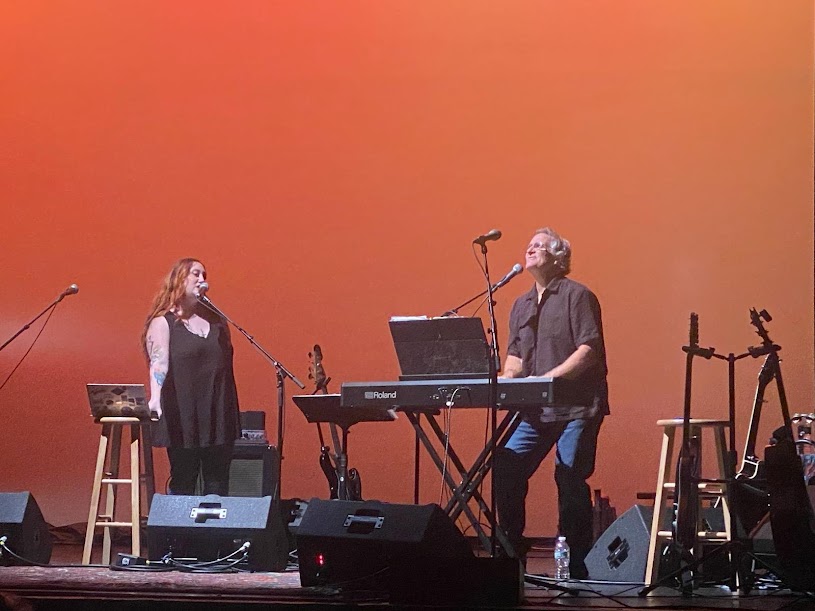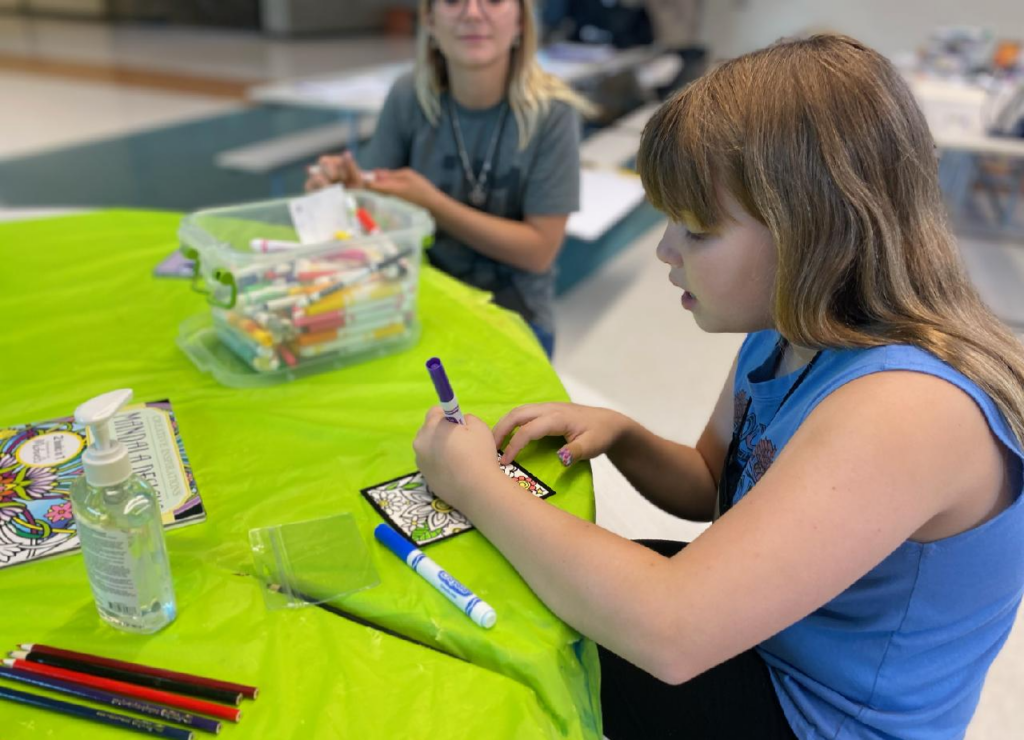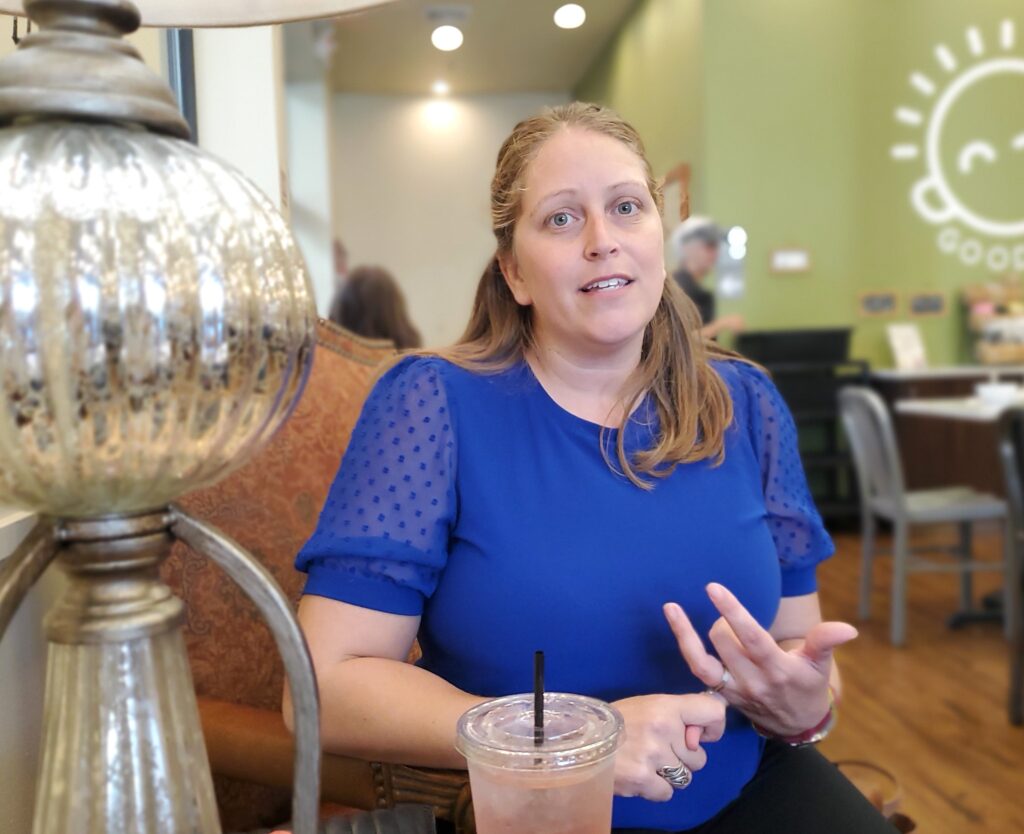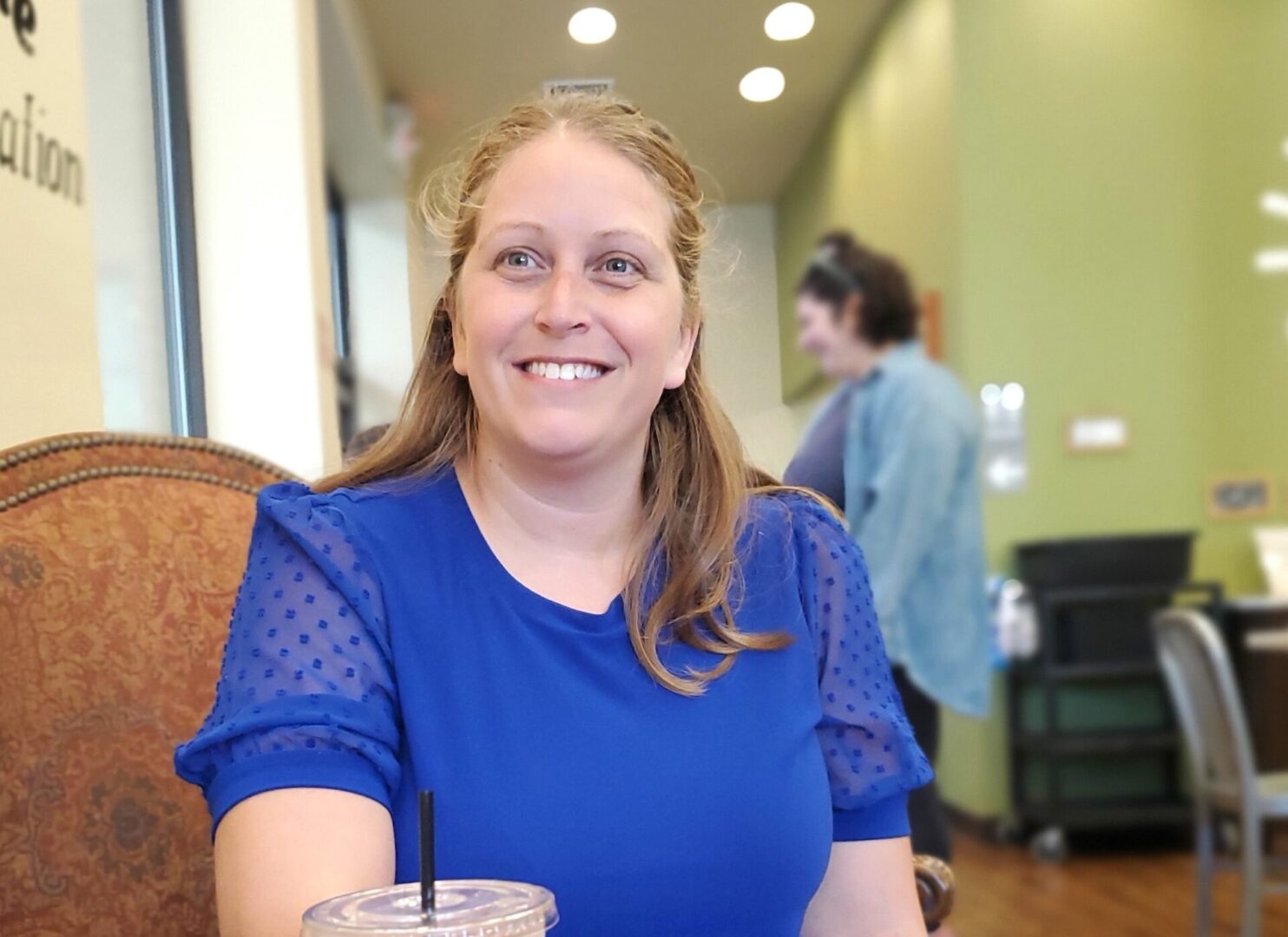It was certainly a privilege for me to sit down for coffee with Marisa Vicere, the founder and president of Jana Marie Foundation.
Not because of our location, though I dearly love Good Day Café, a branch of Strawberry Fields that provides employment for adults with disabilities. And not because Marisa is the wife of Jeff Byers, the legendary voice of Penn State wrestling and a founder of Sports Radio 98.7 The Fox. As much as I would have liked to talk wrestling with Marisa—yes, she is a fan—a more critical topic demanded our attention.
Ever since her older sister, Jana Marie, died by suicide in 2011 after a lifelong battle with depression, Marisa has sought to promote mental health and to work against suicide. That calling led her to start the Jana Marie Foundation in 2012. Today, the foundation employs five full-time individuals and a handful of part-timers, all working on behalf of Centre Countians, especially its teenagers.
Knowing that September is Suicide Prevention Month and knowing that a unique concert will be held this Friday to benefit the foundation, I figured it was a great time to talk with Marisa. And we both decided there was no better place than the coffee shop that exists to provide employment for people with intellectual disabilities or mental health challenges. The following is an edited portion of our conversation.
What’s your top priority right now? What’s really on your heart?
Vicere: As you know, September is Suicide Prevention Month. It’s a time when we can use our collective voice to help raise awareness on the warning signs and the ways we can reach out to help someone or to reach out for help ourselves. And I think that’s one of the messages that’s most important—that we are not alone on our journey. Suicide Prevention Month allows us to shine light on this important topic and encourages us to engage in courageous conversations.
Does this special September emphasis on suicide prevention help you to grab people’s attention?
Vicere: We were talking about different nonprofits a minute ago, and it really is a time for all of our organizations to come together and to stand together for this one cause. That’s really what Philosophy of Hope is about. It’s getting a bunch of artists together who are passionate about mental health, well-being and suicide prevention to form one band and to help raise that awareness.
The Philosophy of Hope concert will be held at the State Theatre on Friday at 7 p.m. Can you describe the unique way that the musicians combine their talents to help promote mental health and to help prevent suicide?
Vicere: Yeah, so Ken Baxter is the producer of the concert. He is a musician who is absolutely phenomenal. We were connected to him about five years ago because we share the loss of somebody close to us from suicide. He lost his son, Alex, and wanted to do something to help remember Alex and also give back to the community. So we ended up forging this partnership to create the benefit concert for Jana Marie Foundation. Ken is amazing at pulling together different musicians from the area to help stand together. This year we have Sam Christensen, Molly Countermine, Chris Bell, Blue in the Face and many more. There are over 18 musicians who will be coming together on the stage. It will really be a musical journey of life’s ups and downs and how we can lean into one another and work on building the connections of community that are so important.
When you say 18 musicians on stage, will they all be playing simultaneously?
Vicere: They will. That’s really what sets this concert apart from some of the other fundraisers that are out there. It is quite a production to put this on because they really come together to form one band. It’s pretty remarkable to hear them create such a beautiful, harmonious sound to help raise awareness.
How do people get tickets and how do you utilize the funds that are raised?
Vicere: Tickets are available at thestatetheater.org. This year we are excited to offer both regular and student pricing. All of the funds raised will help support our youth programs. We run in-school and after-school programs and summer camps, and all of those are offered at no cost to the community.
Do you have a financial goal for this year?
Vicere: We’re hoping to generate at least $25,000. We are seeing an increase in attendance at our programs and we want to continue meeting the needs of our community—being able to do more fun things that will help build resilience in young people.

How would you assess the mental health atmosphere of our community?
Vicere: We continue to see growing needs for mental health in our community and across the nation. And so I think it’s really important that we create places where kids and adults feel like they belong and where we can provide education about mental health. Really, mental health is health. So if we spend a lot of time talking about our physical health, then we also need to spend a lot of time talking about our mental health.
Do you have any statistics available that can show us what’s really going on?
Vicere: Well, the latest PAYS data (the Pennsylvania Youth Survey, conducted by the Pennsylvania Commission on Crime and Delinquency) shows that one in six of our young people have seriously considered suicide. One in eight have a plan for suicide. And one in 10 have attempted suicide. Those numbers come from students in sixth through 12th grades. So we see that thoughts of suicide are not uncommon.
Those numbers are from all across Pennsylvania, right?
Vicere: Yes, but they’re basically the same for Centre County.
How did you respond to those numbers?
Vicere: It’s just eye-opening. These numbers demonstrate that thoughts of suicide are not uncommon and that our kids have a lot on their minds. We must work as a community to increase protective factors and invest in mental wellness initiatives. I think it’s really important that we create spaces where we are able to meet the kids where they’re at and really be there to support them.
If more people are feeling free to discuss mental health does that mean the stigma surrounding that topic is in retreat?
Vicere: I think our younger generations are more open in talking about mental health. It’s something that they’ve grown up with over the last few years. But the Jana Marie Foundation does a lot of education for parents and caregivers and educators because that comfort level isn’t necessarily there for everyone. We still have a long way to go, but at least we’re starting to see some changes.
Is there a particular factor that’s relatively unknown or overlooked which is working against the mental health of our kids?
Vicere: Across the nation we’re seeing shortages in counselors, psychologists and psychiatrists. And so the access to care may be hard, but that also leaves space for innovative programs. At Jana Marie Foundation we don’t do any counseling of any kind, but we can be a great resource to work on resilience, building connections and working on protective factors that are so important for mental health and wellbeing.
Is there a reason why you don’t do counseling?
Vicere: What it really comes down to is that mental health is universal. We all have mental health and we’re all on a spectrum regarding it. We believe everyone needs to have mental health education, as well as outlets where we feel comfortable to share what’s going on inside. So for Jana Marie Foundation, we want to create spaces where everyone feels accepted and understood for who they are.

It’s not like there are two categories—those who need help and those who don’t.
Vicere: We all need help. We all go through ups and downs in life, and we all have stresses every single day that we have to navigate. So the more equipped we are, the more tools that we have in our toolbox, the easier it will be to navigate those times when things feel overwhelming. And if things feel really overwhelming, we’ll also know a bunch of people who can help us carry that weight until we figure out our next step.
Tell me about your programs. I’m sure there are some that you can’t wait to talk about.
Vicere: We take a three-tiered approach to our mission. First and foremost, we focus on the young people: building protective factors, making sure they have tools to overcome adversity and making sure they have ways to maintain healthy relationships. So we have youth retreats, “Embrace” for young women and “Ignite” for young men. They are one of the first things we did and they still hold a really special place in my heart. Based off of Jana’s journals, we bring middle school students together for a fun-filled day of activities that are focused on self-care and wellness. Each of those events has a special theme, and one of the ones that sticks in my mind is “Finding Your North Star.” We had the kids create artwork based on stars and got them thinking about their points of purpose and how they can keep navigating through life.
We also hold mother-daughter retreats, which are really fun. A middle school girl will come with her mom or caregiver or somebody meaningful in her life. We spend the day together where they focus on connection. We’ll look at different love languages; we’ll cook together; we’ll create together. One of the things that we hear from our young people is that they wish mom and dad would talk to them more and do more activities with them. And what we hear from the caregiver side is, “I wish my kids would want to do more with me.” And so it’s creating those spaces where they can all just put down their phones or whatever else is going on and really focus on that connection.

These programs that you’ve just mentioned, are they designed for people in State College Area School District or all of Centre County?
Vicere: Centre County.
Is that the case with everything you offer?
Vicere: Yes. And those are just examples of some of our youth programs. But we also do a lot of education programs, and that’s the second tier of our mission. We use evidence-based education programs, ones that were developed outside of Jana Marie Foundation to educate around mental health and suicide prevention. We’re now in four school districts, offering “Team Mental Health First Aid” to 10th grade students.
What are those school districts?
Vicere: State College, Penns Valley, Bellefonte and Bald Eagle. And so we’re really excited to be able to deliver that to so many 10th grade students. And then we also deliver “Youth Mental Health First Aid” and “Adult Mental Health First Aid” to the community—to caregivers and to Penn State students. So this just creates that larger shared language where we can look out for one another and be there to help. In terms of education, we’ve also developed our own programs like “Mind Matters.” It’s an upstream approach to suicide where we look at various protective factors.
And we’ve worked with the Juniata Valley Council of the Boy Scouts of America to create a curriculum called “Be Prepared” that’s specific to the scouting community. We ran it this summer with more than 200 Scouts going through it at Seven Mountains Scout Camp, and we got a lot of really great feedback.
What’s the third tier of your work?
Vicere: Our awareness events. We’re doing what we can to help break down the stigmas or barriers about mental health that have existed in our community. And so recently on September 10 we held an “Evening of Hope, Healing and Remembrance” on World Suicide Prevention Day. I think that is always the most powerful event that we hold. Centre Dance provided some beautiful dancers to perform. And we had Biscuit Jam sing and play. And there were speakers who had been touched by suicide in some way sharing stories of hope and resilience.

It sounds to me like the overall goal for you is to flavor the community with awareness of mental health—the struggles, the dangers, the resources.
Vicere: I just think we have to. It really does take a community when it comes to watching out for one another. And I think Jana Marie Foundation’s approach is to create that big support network for our young people. We have to have education and awareness at every level of our community because that’s how we’re going to build a support network for our kids.
How about telling me a story that shows the impact of Jana Marie Foundation?
Vicere: I was talking to a parent a few months ago and they were telling me a story from when we used to partner with Monarch Martial Arts. Our students would each write down something on a board that someone had said to bring them down. And then they would break that board. So now this kid was going to college and the parent was cleaning out the kid’s room. Underneath the bed was that broken board – with the words written on it “I AM STRONG.” And I think that shows that our programs really do make a difference. Those messages remain with them, reminding them that we all have our own unique abilities.



